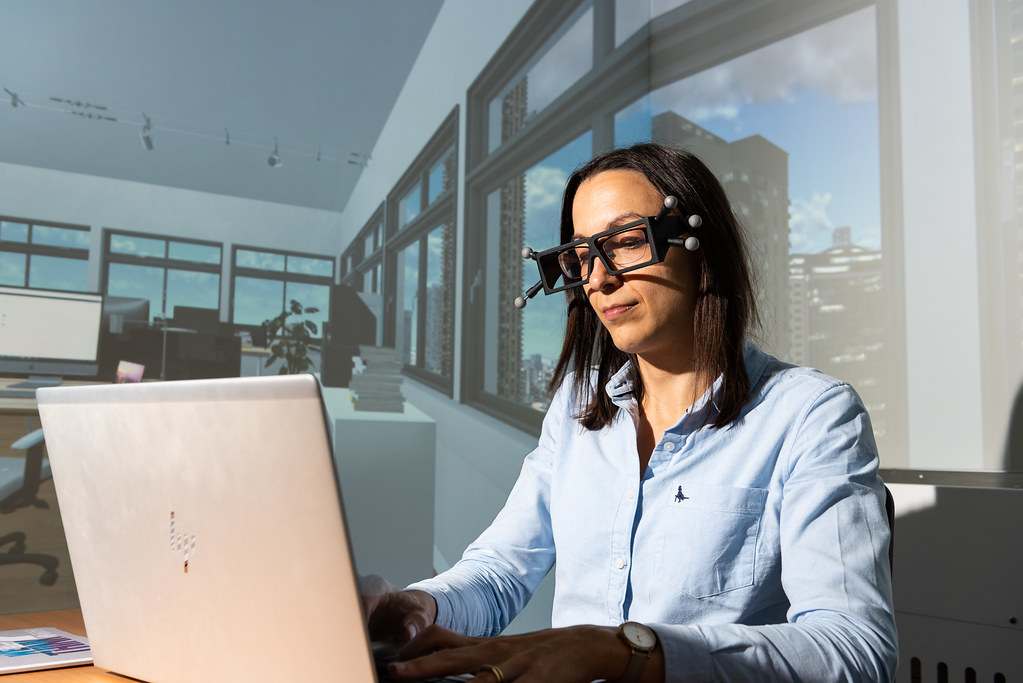A simulator that uses virtual reality projection and a moving hydraulic platform to immerse people in a range of lifelike environments has opened at the University of Bath.
The VSimulators platform, which will be used to investigate how people interact with and are affected by buildings and the built environment, was officially opened this week by the President of the Institution of Civil Engineers, Andrew Wyllie CBE.
Over 100 people attended the launch event at the University, which featured talks from representatives from the project’s industry partners including Antycip Simulation, BMT, Temperature Applied Sciences and Servotest Systems. Attendees were also given the chance to experience the VSimulators platform, which is housed within the Department of Architecture & Civil Engineering’s Structures Lab.
Sophisticated simulations
Combined with lighting, sound, temperature and airflow controls, the VSimulators platform’s sophisticated projected virtual reality (VR) and movement capabilities will allow researchers to investigate a range of questions about responses to the built environment. These include how to design buildings to boost the mood of their occupants, how people’s productivity can be affected by working in tall buildings and what level of movement is acceptable in a footbridge or train carriage.
VR projections on the walls of the 3x4 metre chamber, combined with motion-tracking glasses, will allow the space to be realistically configured as an office, apartment, hotel room or hospital ward, giving the researchers the chance to create convincing ‘mixed reality’ simulations.
During the launch event, Andrew Wyllie said: “VSimulators will provide a catalyst for change within the built environment, with the potential to make a positive difference to millions of people’s daily lives.
“It will draw together a range of industry and academic sectors to place human responses at the core of design, helping to transform the places in which we live, work, study, are entertained and travel.
“The VSimulators project will also support much needed research into making design guidelines fit for purpose and exploration into the use of lightweight materials as part of a move towards sustainable construction methods.”
Dr Antony Darby, Head of Civil Engineering at the University of Bath, and one of the lead investigators on the VSimulators project said: “It’s exciting to be opening the VSimulators facility and putting its capabilities to the test – alongside our suppliers, we’ve worked hard to ensure it can convincingly recreate a range of situations.
“The issues we are researching, for example how much sway is acceptable in a very tall building before people inside start to feel negative effects, require highly immersive simulations, so we’ve brought together a diverse set of technologies to create a facility that is globally unique.”
Studies into the acceptability of movement and vibrations in buildings or structures will help authorities develop future guidelines for architects and civil engineers.
The VSimulator will also be made available for industrial research and commercial use. Research teams have already identified over 50 potential applications for the facility, including immersive VR game development, physical rehabilitation and driverless vehicle design. Interested parties are invited to contact the VSimulators team to discuss future opportunities in research collaborations using the platforms.
Multiple capabilities for multi-discipline research
The team behind VSimulators are aiming to bring together a range of industry and academic sectors to investigate a range of topics, including:
Built environment - investigating how to transform construction processes, make modular design more accessible and reduce embodied energy (the amount of resources used in building structures), by making design focused on the needs of people using a building or piece of infrastructure.
Transport - researching acceleration, deceleration and motion in transport - including human response to vibrations, assisted driving and balance
Human factors & comfort - researching how people perceive and respond to their environment, ensuring structures are comfortable and fit for purpose
Vibration engineering - supporting research into vibration of structures, machinery and other engineered facilities, and developing design recommendations to ensure human comfort
Health & wellbeing - improving understanding of how people move, how they balance and how they respond to their surroundings including moving structures (such as a swaying bridge)
Immersive reality - using state-of-the-art virtual reality technology aligned to the motion platform and other controls to create an immersive experience for one or more people
Data science & analytics - the facility can coordinate multiple information feeds, contributing to the development of new ways of visually interpreting, analysing and using complex data
Creative industries - the VSimulators chamber can be used to develop new creative techniques, as a tool for expression, performance and storytelling
A collaborative project
The chamber at Bath is the first of two planned VSimulators platforms to open. A second, complementary facility at the University of Exeter will be launched in early 2020.
The VSimulators project, which is made up of a team of researchers from the Universities of Bath, Exeter, and Leicester and supported by collaboration from industrial partners, is funded by a £4.8 million infrastructure project grant from the {Engineering and Physical Sciences Research Council] (https://epsrc.ukri.org/) (EPSRC).


